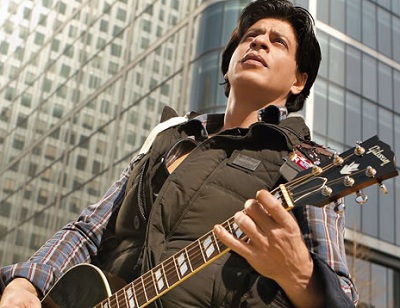
 |
 âPure love stories are immortal.â This is how director Yash Chopra chose to introduce his films to an Australian audience in 2006. When applied to his latest and final film however, there is a sense that reality falls short of the ideal. The story and dialogues created by Aditya Chopra with the intention of conveying a deep spiritual union in a modern milieu, roll to a conclusion that seems forced, too manicured and ultimately - lacking in passion. âPure love stories are immortal.â This is how director Yash Chopra chose to introduce his films to an Australian audience in 2006. When applied to his latest and final film however, there is a sense that reality falls short of the ideal. The story and dialogues created by Aditya Chopra with the intention of conveying a deep spiritual union in a modern milieu, roll to a conclusion that seems forced, too manicured and ultimately - lacking in passion.
The heroineâs sense of spirituality is problematic. If she were a simple girl in some rural spot then her constant and rather child-like dialogue with Jesus would have been more credible. Dialogues with the Maker have been features of previous Aditya Chopra penned love stories such as Rab Ne Bana Di Jodi and Dil To Pagal Hai. In Jab Tak Hai Jaan these conversations become obsessive, taking on mystical and superstitious qualities that one doesnât associate with modern, urban life. Katrina Kaif does not project what would have taken the likes of Nargis to perform convincingly - âa jogan-like devotion.â
As a jodi Shah Rukh Khan and Katrina Kaif are mismatched not because he is older but because his acting style is correct for this type of film and hers is not quite ready. The extreme close-ups demand saturated emotion. Even repression needs to pulsate and it just doesnât. Katrinaâs face is generally too composed - her expressions are too bland and repetitive so that Shah Rukh Khan is not given the support he needs to give his best. The âkissing scenesâ in particular seemed awkward. Partly because I believe that Aditya Chopra may have included them to modernise the film. It is well known that Shah Rukh Khan has deliberately avoided kissing in his films, so the clumsy shots showing the backs of heads rather than locked lips could have evolved out of deference to the actor himself. Whatever the case, passion-wise it didnât come close to Veer and Zaara (even when they were geriatric).
Pre-intermission thereâs a retrospectively narrated account of Samar Anandâs earlier life in London and his great love. Most of the songs (A. R. Rahman/Gulzar) feature in this portion and in the main, drive the story purposefully forward with the exception of the overly long party song â âIshq Shavaâ. This seemed to go on like a number from Jhoom Bharabar Jhoom with a separate dance segment tacked onto an already lengthy song. A dance routine integrated with the song would have sufficed to show that the couple were having a fun, liberating time. Itâs common for Yash Chopra heroineâs to be a little child-like. Remember Zaara with her nanny; Sharmila Tagore in the early stages of Daag; Sri Devi as the daughter in Lamhe or Juhi Chalwa as a college student in Darr. This child-like quality is there in Katrinaâs character which gives her the archetypal role. Anushka Sharma plays a modern documentary filmmaker who meets Samar (Shah Rukh Khan) when he is with the Indian Army diffusing bombs in Ladakh. It is a bubbly role for which she is well suited and some of the more convincing scenes are between Akira (Anushka Sharma) and Samar. It is natural to suspend disbelief when watching Yash Chopra romances. Of course there will be coincidences, unbelievable twists of fate, vagaries of destiny but despite all improbability, one is often swept away. Deep longing is usually projected by the male lead. It is born of entrapment and is overwhelming. Love that crosses the boundaries of race, religion and age has fed the narratives of previous films. And these films have worked because the premises in them have been strong and identifiable. The motivations for charactersâ actions in Jab Tak Hai Jaan is esoteric - grand but in rather a contrived way. With previous films there was a sense of being manipulated but not minding it because something quite genuine was being communicated beneath the operatic show. Certainly messages are spelt out very clearly at the end of Yash Chopra films but I felt that it was not just overstated in this case. It was more as if we needed to be âschooledâ in the exact meaning of the filmâs protracted denouement. There are shades of Veer-Zaara in Jab Tak Hai Jaan which makes the latter a lesser film by comparison. I miss the traditional folk themes motifs that Yash Chopra often used; the old-world charm conveyed by actors practised in Bollywood technique. Although Anil Mehtaâs cinematography is as beautiful as always, I know that the time of chiffon saris in Switzerland is over and Iâm sad.
|
|||||||||||||||||||||
| Comments | Contact Us | Advertise | Terms of Service | Privacy Policy |